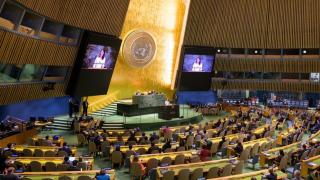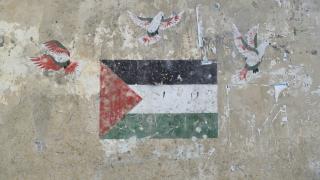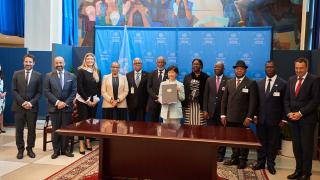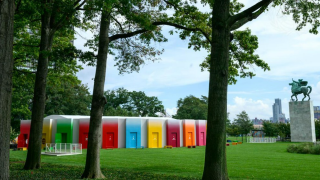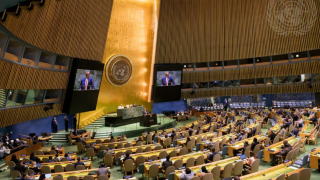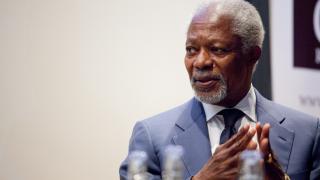
Part of our regular series of background briefings on the UN in the news.
Kofi Annan died on the 18th August 2018. We are hosting a commemoration of his life and legacy on the 3rd June 2019.
In advance of this event we have prepared the following briefing.
Who was Kofi Annan?
Kofi Atta Annan was the seventh Secretary-General of the United Nations and the first – and so far only – Secretary-General to work his way up through the ranks of the Organisation.
Born in 1938 in Kumasi, Ghana, he joined the UN in 1962 as a budget officer for the World Health Organization. With the exception of a two-year spell working for the Ghanaian tourist board in the 1970s, he would work for the Organisation for the next four and a half decades.
In 1980 he became the head of personnel for the office of the UN High Commission for Refugees (UNHCR). In 1987, Annan was appointed as an Assistant Secretary-General for Human Resources. In 1993 he was made Under Secretary-General and head of the Department for Peacekeeping Operations (DPKO).
In 1996 Boutros Boutros-Ghali became the first ever Secretary-General to be denied a second term, having been vetoed by the United States due to a falling out over a number of issues including UN reform and the arrears the US owed the Organisation. Annan was appointed as his replacement, serving two full terms from 1997 until 2006.
After leaving the United Nations Annan continued to pursue his agenda via the Kofi Annan Foundation, and the Elders – a group of retired global leaders which he chaired from 2013-2018. In 2007 he chaired the Panel of Eminent African Personalities who negotiated an end to the violence following disputed elections in Kenya. He worked as Special Envoy for Syria in 2012 and developed the six-point peace plan which remains, to this day, the baseline for negotiations to end the civil war. His last significant public role was in chairing the controversial “Annan Commission” on violence in Rakhine state in Myanmar.
He died in 2018. We collected responses and reflections on his death here.
What was his legacy for human rights?
Annan was a key proponent of the UN Human Rights Council, which UN member states established to replace the previous Commission on Human Rights. On balance most consider the Council to be a considerable improvement on the previous body. This can be credited to innovations such as the Universal Periodic Review, which allows for peer review between states, and greater involvement from civil society.
This work took place during a challenging time as the “war on terror” led to a hostile environment for rights. Annan's first High Commissioner for Human Rights, Mary Robinson, left after only one year of her second term as a consequence of US hostility over criticism of Guantanamo Bay and controversy following perceptions of anti-Semitism following discussion of Israel at the 2000 world summit on racism. His second High Commissioner, Sergio de Mello, was killed in a terrorist attack while on secondment as head of the UN mission to Iraq. 22 other members of staff were killed in one of the bloodiest days in the UN’s history. In this context Annan's sparing and strategic use of the moral authority of the Secretary-General in support of human rights was influential.
What was his legacy for peace and security?
Annan supported states in establising the Peacebuilding Commission, a groundbreaking intergovernmental advisory body of both the United Nations General Assembly and the United Nations Security Council that supports peace efforts in conflict affected countries. While the Peacebuilding Commission has arguably never been used to its full potential it remains an innovative response to the question of how the international community can support sustainable peace. He also made effective use of the "good offices" function of the Secretary-General to bring various conflicts to an end, notably in Timor-Leste.
Annan steered the Organisation through several international crises, notably the 2003 decision by the United States and the United Kingdom to invade Iraq without explicit Security Council approval. This raised existential questions about the purpose and primacy of the UN Security Council in maintaining global peace. Annan’s principled decision to declare the invasion “illegal” saved the moral authority of the Organisation, and ensured that it retained widespread global support, but earned him the antagonism of the British and American Governments.
He won the Nobel Peace Prize, alongside the UN, in 2001.
What was his legacy to development?
Annan spearheaded the adoption of the “Millennium Development Goals”, an ambitious fifteen year agenda for the planet which saw the number of people living in extreme poverty fall by half. He also helped establish the Global Fund to Fight HIV/Aids and spearheaded initiatives on debt forgiveness and good governance in sub-Saharan Africa. His "Delivering as One" report was a major step in the ongoing process of improving coordination between UN development and humanitarian agencies.
Annan worked hard to lobby the heads of major pharmacutical companies to make cheap anti-retroviral drugs available in developing countries. This doubtless saved many thousands of lives.
How did he work?
Annan made good use of the Secretary-General’s ability to bring his own thoughts to world leaders and so set the agenda; being a voice for the views of the Organisation, and not just a servant of member states. He persuaded states to hold a World Summit in 2000 where he presented “We the Peoples”, a report of the UN’s own ideas of how the system could be improved. Alongside a second report, “In Larger Freedom”, in 2005 and the 2004 report of his High-level Panel on Threats, Challenges and Change this publication remains a touchstone in the conversation about UN reform to this day.
Annan also reached out beyond member states to the public, civil society, and private sector, in a way few Secretaries-General have before or since. He appeared on Sesame Street, and launched the United Nations Global Compact, an initiative that helps businesses catalyse actions in support of UN goals.
In what way is his legacy controversial?
Annan was haunted by the legacy of his failures, as head of the Department for Peacekeeping Operations, to prevent atrocities in Rwanda and the former Yugoslavia. While blame should primarily fall with the world leaders, and in particular the Security Council members, who did not act to prevent catastrophe, Annan was followed by the perception that he could have done more.
It is important not to whitewash Annan’s legacy, but it should be understood that Annan dedicated much of his time as Secretary-General to making future atrocities less likely. He commissioned the “Brahimi Report” on how the UN conducts peace operations, which started a process of fundamentally altering the nature of UN Peacekeeping. Peacekeepers are now expected to “robustly” use force in defence of “protection of civilians” mandates. He further championed the principle of the “Responsibility to Protect” (R2P) – a reimagination of state sovereignty not as an absolute but as something limited by the extent to which leaders uphold their responsibility to prevent atrocity crimes against their citizens. Atrocities are by no means a thing of the past, and UNA-UK continues to work to identify gaps and shortcomings in UN Peacekeeping and R2P, but the evolution of these agendas under Annan gives the international community the tools it needs to prevent atrocities – if they use them.
What about oil for food?
The Oil-for-Food programme was a controversial mechanism devised by the UN Security Council in the mid-1990s to allow Iraq to sell its oil on international markets on the condition that resources generated were not used to rebuild its military. In the 2000s there were a string of corruption allegations regarding the scheme, particularly with reference to Annan and his son Kojo.
Ultimately an inquiry chaired by Paul Volcker, former head of the US Federal Reserve, exonerated Annan while heavily criticising Security Council members for their lack of oversight of the scheme. The Sunday Times was forced to pay significant libel damages to Kojo.
The controversy highlighted significant issues with regard to mismanagement and corruption within the Organisation. Nevertheless, it is important to recall the context in which the scandal took place: with many critics in the US and UK looking to weaponise the scandal to diminish the Organisation which had opposed them so embarrassingly over the invasion of Iraq.
What is Annan’s lasting legacy and what does it tell us about the future?
Annan’s death in 2018 coincided with a growing backlash against the values he espoused: multilateralism, principled non-transactional leadership, a rejection of exceptionalism – particularly by western powers, the power of negotiation in preventing conflict, the value of global institutions and a global system of rules, and a desire for ambitious and systemic reform of the United Nations. It is therefore an apt time to consider what lessons we can draw from his successes and failures, and what action is needed now to address the challenges we face as a global community.
Annan demonstrated how one could achieve meaningful change in global affairs, promote development, safeguard rights and prevent conflict in the face of a challenging political climate and hostile unilateralist permanent members of the Security Council. It is fitting that our commemoration of Annan’s memory takes place during a state visit by one of those members to another.
Next year will see the 75th anniversary of the United Nations. UNA-UK will use this opportunity to present the world’s leaders with a civil-society generated to-do list for fixing the world’s problems, via our “Together First” initiative. In this way we intend to turn Kofi Annan’s legacy into a programme for action.
What is UNA-UK doing to commemorate Annan?
UNA-UK have partnered with Chatham House to deliver a two-day programme of events to commemorate the life and legacy of Kofi Annan.
During the day of the third and fourth of June Chatham House will host an invitation-only policy conference to discuss the future of global governance. This event will be livestreamed.
On the evening of the third UNA-UK will organise a public commemoration at Central Hall Westminster. A small number of tickets are still available, and a recording of the event and photographs will be posted to our website in the days to come. If you are a journalist contact us, and we will send this to you as soon as it is available.
We will cover both events on social media using the hashtags #ForKofi (for the public event) and #OurSharedHumanity (for the conference)
Photo: Kofi Annan at a UNA-UK event in 2014. Credit UNA-UK

